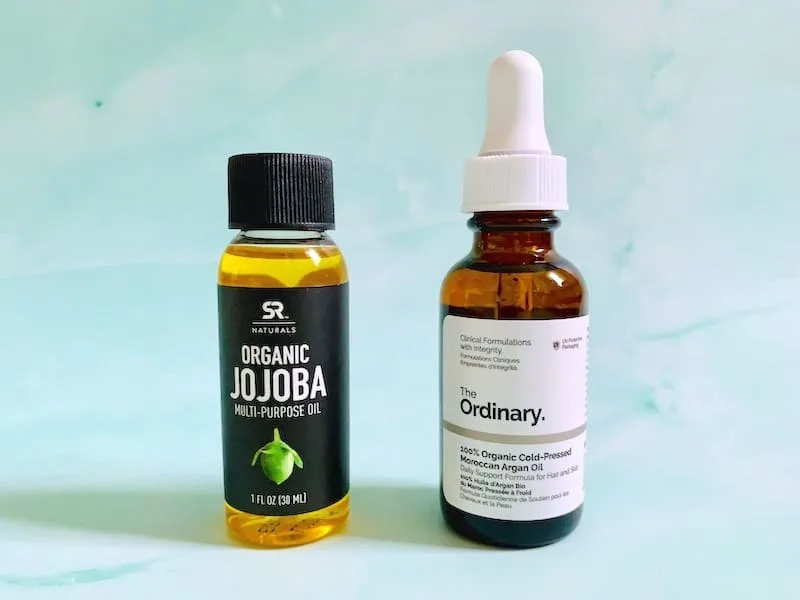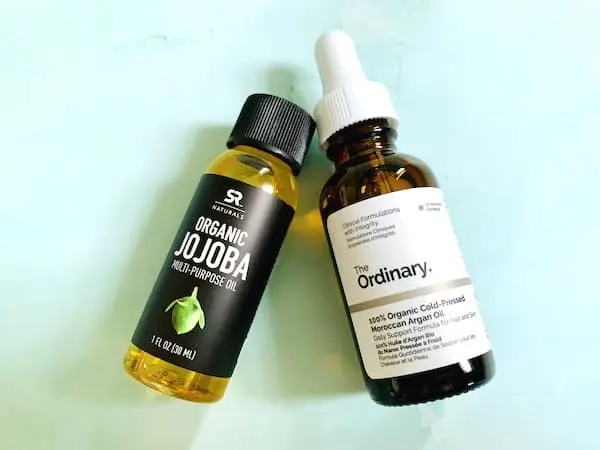There are so many face oils on the market these days that it can be hard to decide which one is best for your skin type. Two of the most popular oils are jojoba oil and argan oil. So when it comes to jojoba oil vs argan oil for skin, which one is better?

The answer is that it depends on your skin type and your skin concerns. Both have moisturizing and skin protective benefits, but one might be better than the other for your unique complexion.
In this post, we’ll discuss the benefits of jojoba oil vs argan oil so you can decide which one would work best for you.
This jojoba oil vs argan oil post contains affiliate links, and any purchases made through these links will result in a commission for me at no extra cost to you. Please read my Disclosure for additional information.
Jump Ahead To:
Jojoba Oil vs Argan Oil
While both oils can be used undiluted on your face, in general, those with combination, oily, and acne-prone skin will benefit more from jojoba oil, and those with dry skin will benefit most from argan oil.
But since everyone’s skin and skin concerns are different, it is best to determine your skincare goals before purchasing.
It is also important to patch test both oils and any new product before applying to your face for the first time.
Let’s look at the benefits of both oils and why they might be better for your skin type.
Jojoba Oil Benefits for Skin

Jojoba oil, also known as Simmondsia chinensis seed oil, is a golden yellow oil that comes from the seeds of the jojoba plant.
This plant is native to the dry regions of the southwestern US and northwestern New Mexico in North America.
An interesting fact to note about jojoba oil is that it isn’t really an oil at all. About 98% of jojoba oil is wax, mainly wax ester (esters of long-chain fatty acids and fatty alcohols).
These wax esters protect the jojoba plant’s leaves and help it hold onto moisture in the harsh desert environment.
Jojoba oil also contains a few fatty acids, including eicosenoic acid and oleic acid, and vitamins A, D, and E, along with a small amount of antioxidants. Jojoba oil is a stable oil with a long shelf life.
The oil spreads well over the skin, making jojoba oil a popular massage oil.
But how about for the face? Jojoba oil is an excellent moisturizer, as it forms a breathable barrier on the skin that prevents moisture from escaping.
Jojoba Oil for Oily and Acne-Prone Skin
Jojoba oil has very similar properties to the sebum (oil) in our skin.
Jojoba oil is non-comedogenic and won’t clog pores, so per acne.org, it is safe to use by those with acne-prone skin and might even be able to balance oil production in our skin which can be helpful to those with oily skin.
Jojoba oil has anti-inflammatory properties, which can help to soothe irritated skin. It also calms inflamed acne-prone skin and helps to speed up the healing process.
These properties also make jojoba very beneficial for skin concerns like acne scars, psoriasis, eczema, and seborrheic dermatitis.
Jojoba oil has antibacterial properties, so it works well on acne-prone skin. Jojoba oil also contains iodine, which can help with wound healing and speed up healing from acne scars and blemish marks.
In addition, jojoba oil contains antioxidants, which can help to protect the skin from free radicals and sun damage.
Using Jojoba Oil in Your Skincare Routine
- With its non-greasy texture, as it forms a breathable layer on the skin, this face oil is a great all-rounder for not just your face but all over your body. It is an emollient, which can help to soften and soothe the skin.
- While you may first think of it as a moisturizer for dry skin, jojoba oil also works well as a makeup remover and can take the place of a pricier cleansing balm or oil.
- Jojoba oil may also be used on the skin around your nails to soften and nourish the cuticles, as well as the rest of your hands.
- You can use jojoba oil on your lips alone or as part of a moisturizing lip balm, as it absorbs quickly and won’t leave a sticky greasy finish.
- Jojoba oil can be used as a spot treatment to help soothe skin irritations, psoriasis, or eczema. Simply apply a few drops to the affected area and let it absorb.
- Jojoba oil is often used as a carrier oil for essential oils. It’s lightweight and absorbs quickly into the skin without leaving an oily residue behind, which makes it an ideal carrier oil for applying essential oils to your skin.
Argan Oil Benefits for Skin

Argan oil, officially known as Argania spinosa kernel oil, is a natural oil that comes from the kernels of the argan nut, found in the fruit of argan trees that are primarily found in southwestern Morocco.
The trees can live up to 200 years old, and they are one of the longest-living tree species on Earth.
Argan oil has been used for centuries to address skin concerns such as dryness and acne. Often called “liquid gold,” argan oil is a luxurious oil rich in antioxidants, vitamins, and minerals.
It has a high concentration of unsaturated fatty acids. The composition of argan oil’s main fatty acids is oleic acid (43-49%), linoleic acid (29-36%), and palmitic acid (11-15%).
Argan Oil for Dry and Aging Skin
The fatty acids in argan oil are essential for healthy skin as they help maintain the skin’s moisture barrier and prevent moisture loss, making argan oil an ideal oil for dry skin.
Argan oil is also rich in vitamin E, a powerful antioxidant that helps protect the skin from oxidative stress due to environmental factors such as sun damage and pollution.
Although argan oil is considered non-comedogenic (it won’t clog pores), since it has such a high oleic acid concentration, it may be too rich for oily and acne-prone skin types.
This clinical study found that consuming the oil internally and the topical application of argan oil improved the elasticity of post-menopausal skin.
So those with aging and mature skin may also benefit from argan oil’s anti-aging properties.
Using Argan Oil in Your Skincare Routine
- Like jojoba oil, argan oil can be used as a moisturizer on its own or as an ingredient in skin care products. It can be used on both the face and body.
- Argan oil is also beneficial for skin conditions like eczema and psoriasis. The essential fatty acids in argan oil help to reduce inflammation associated with these skin conditions.
- Argan oil is an ideal moisturizing oil for wrinkles because it may improve skin elasticity, helping to reduce the look of wrinkles and fine lines.
Jojoba Oil or Argan Oil: Which Is The Best Oil For Your Skin?

Both jojoba oil and argan oil are beneficial for the skin, but the best option for you depends on your skin type and skin concerns:
Dry Skin: If you have dry skin, both oils will moisturize the skin, but argan oil may be a better option because it is richer in essential fatty acids.
Argan oil is a moisturizer that penetrates your skin, so it’s an excellent option for those with dry skin.
Oily Skin: If you have oily skin, jojoba oil is probably the better choice. Jojoba oil is a lightweight oil that absorbs quickly into the skin, doesn’t leave an oily residue, and may even balance oil production.
Combination Skin: If you have combination skin, jojoba oil and argan oil could be a good choice for your skin.
Jojoba oil is beneficial for oily skin, while argan oil is beneficial for dry skin, so using both on targeted areas of your skin may be helpful.
Acne-Prone Skin: Jojoba oil is a great choice for acne-prone skin because it is non-comedogenic. Argan oil may be too rich for oily and acne-prone due to its high oleic acid content.
Aging Skin: Argan oil is beneficial for most skin types, but it’s especially great for aging skin. The antioxidants in argan oil can help to reduce the appearance of wrinkles and fine lines.
Sensitive Skin: Both jojoba oil and argan oil are non-irritating and have anti-inflammatory benefits, so they can be a good choice for those with sensitive skin.
Just be sure to patch test any new oil or skincare product before applying them to your skin for the first time.
Normal Skin: Normal skin can benefit from both oils, so you may want to try each oil and see which you prefer.
TIP: Both jojoba oil and argan oil can be used as hair oils, as well. They are great moisturizers for dry and damaged hair and can help prevent split ends.
Alternative Oils for Acne-Prone Skin
If you have acne-prone skin and are looking for an alternative to jojoba oil or argan oil, you may want to consider one of the following oils:
Safflower Oil: Safflower oil is high in the fatty acid linoleic acid. Acne patients were shown to have low levels of linoleic acid in their surface lipids, so safflower oil can help replenish linoleic acid in the skin.
Safflower seed oil also inhibits melanin (pigment) production, which can help to reduce hyperpigmentation and post-inflammatory erythema (redness) and scars and marks associated with acne.
Rosehip Seed Oil: Rosehip seed oil is beneficial for acne-prone skin because it contains linoleic acid, which helps to balance acne-prone skin.
It contains antioxidants that help to reduce the appearance of acne scars and marks. Rosehip oil also contains vitamin C, which helps to brighten the skin and supports collagen production.
Sunflower Oil: Sunflower oil is non-comedogenic and won’t clog pores, so it can be a great choice for acne-prone skin. It also helps to reduce inflammation and supports a healthy skin barrier.
Grapeseed Oil: Grapeseed oil is high in linoleic acid and vitamin E, both of which are beneficial for acne-prone skin.
It’s also a lightweight oil easily absorbed into the skin, so it won’t leave a greasy residue on your face.
Final Thoughts on Jojoba Oil vs Argan Oil
Both jojoba oil and argan oil are beneficial for the skin, but which is better depends on your skin needs. Both oils are multi-purpose, can be used all over the body, and also as hair oils!
- Both oils are non-comedogenic, but jojoba oil has a lighter texture and is similar to the sebum in our skin, making it a better choice if you struggle with acne or oily skin.
- Argan oil is especially good for aging, dry, and mature skin types.
Thanks for reading, and until next time, here’s to your good skin health!
